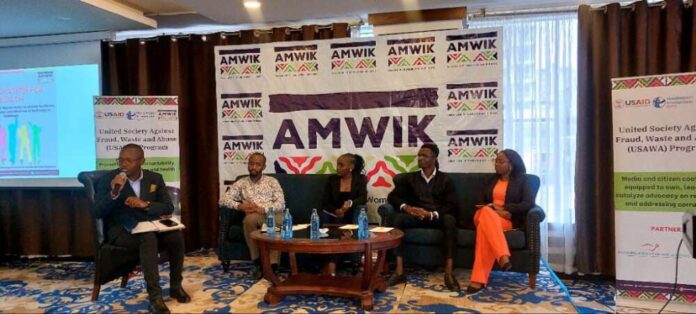
By Joseph Khisa, DevReporter, Nairobi County

Key Highlights
- Access to healthcare remains a significant challenge for many individuals.
- Technological advancements have facilitated the adoption of innovative solutions.
- Technology plays a critical role in enhancing healthcare systems, particularly through telemedicine.
Health is a fundamental human need, yet access to healthcare remains a significant challenge for many individuals. This issue complicates the diagnosis of diseases, particularly in lower-level hospitals.
Technological advancements have facilitated the adoption of innovative solutions. Young people are actively contributing ideas to develop Artificial Intelligence (AI)-driven models that enhance healthcare delivery.
During the Youth-IT Forum on 3 September 2024, at the Golden Tulip Hotel, Association of Media Women in Kenya’s (AMWIK) Executive Director, Queenter Mbori remarked, “Young people represent a very important population in the country. They can drive change in the health sector.”
AMWIK, a non-governmental organisation dedicated to also promoting the Sustainable Development Goals (SDGs), prioritises health in its partnership with USAID under the USAWA project to enhance primary healthcare.
With the 2030 Agenda in focus, Kenya Health Sector’s vision aims to achieve the highest possible health standards through the adoption of innovative ideas. This requires prioritisation to enable the country to progress toward its health goals.
The Kenya Health Act grants every person the right to the highest attainable standard of health, which includes progressive access to promotive, preventive, and curative services.
Achieving primary healthcare as outlined in SDG 3 is essential for ensuring a safe environment for all.
Addressing longstanding healthcare deficiencies necessitates increased investment in health systems to build resilience against health threats.
Technology in Health Promotion
Technology plays a critical role in enhancing healthcare systems, particularly through telemedicine. Digital phones have improved information flow via the Internet and SMS.
Government and corporate initiatives to expand Internet access in remote areas will enhance accessibility to information for many youth, fostering innovative ideas. The adoption of AI technology can also be beneficial.
Faith Laboso, a young data analyst focused on AI machine learning, states, “Data in the health sector is crucial for creating data sets and health models. This data helps train these models, equipping them with information to perform health functions more effectively.”

Way Forward
Kenya-vision 2030 emphasises the crucial role of youth in advancing the country’s health development.
As healthcare increasingly intersects with technology, collaboration and proactive engagement from citizens are essential.
Queenter Mbori points out, “With diverse communities, young people can develop new Apps that translate health information into local dialects, making it comprehensible for rural populations.”
The SDGs for 2030 advocate for inclusive, quality education to ensure that young people have free and equitable access to learning opportunities.
Achieving decent employment and workplace conditions remains a significant challenge, as many youths are engaged in low-paid informal sector jobs.
Community-based interventions to bridge the knowledge gap are vital for achieving health literacy in rural areas.
With internet connectivity, the youth can utilise online data to create accessible content. For example, TikTok videos can effectively disseminate health information.
Related Stories





